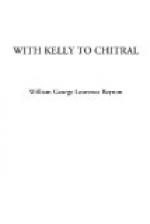The only one of our party who could walk on the snow without difficulty was my bull-terrier “Bill,” a spotted dog of doubtful ancestry. He had been given to me as a bull-terrier when he was only a little white rat of a thing, and I had raised him at Bunji on tinned milk. He was a most uncanny dog (the joke is unintentional), and it was commonly believed in the force that his father was a tom cat. Poor Bill! Before he got to Laspur he was so snow blind that until we got to Mastuj I had to open his eyes for him every morning and bathe them with hot water before he could see, and he was hardly well again a month later.
We got into camp that night before dusk, pretty well fagged and wet, and as soon as the coolies came in with our kits, we scraped a hole in the snow and pitched the colonel’s small tent. In camp we found a few men who had been placed in charge of some ammunition that had been left behind for want of transport. This guard were mostly suffering a bit from snow blindness, but were otherwise all right, as they had run up shelters and had plenty of wood and their bedding. When I got at my kit, I took out a bottle of quinine and dosed our servants and orderlies all round, so that they should not have any excuse for getting fever, and then took some myself for the same reason. We then laid out our bedding in the tent, while the servants went into the hut, and turned in immediately after dinner, and had a very comfortable night.
We were up before dawn the next morning, and, as we had slept in our clothes, it was not long before we had had breakfast and struck camp. By 6 A.M. we were climbing the ascent to the pass. There was a wind whistling straight in our faces, and I had no idea anything could be so cold; it simply went clean through you, and I quite expected to hear my ribs sing like an Aeolian harp. When we got on to the pass, the sun rose and the wind dropped quite suddenly, and presently we had taken off our greatcoats on account of the heat. After going about an hour, I began to suffer from mountain sickness, a curious and distinctly unpleasant sensation, very much like having a rope tied tightly round one’s chest and back, and the shortness of breath necessitating a halt every hundred yards or so. Colonel Kelly did not suffer from it at all, but trudged along without a halt the whole way. That is the only time I have ever suffered from mountain sickness, and I have crossed the Shandur both before and since, as also other passes, without feeling any inconvenience.
By noon we had almost reached the highest point of the pass, and were skirting the larger lake, when we met the coolies of Borradaile’s party returning with an escort of some of the Kashmir troops. They all seemed pretty lively in spite of the poor time they had been having; but as they are used to crossing the Shandur at all times of the year, I daresay our sympathy was a good deal wasted.




